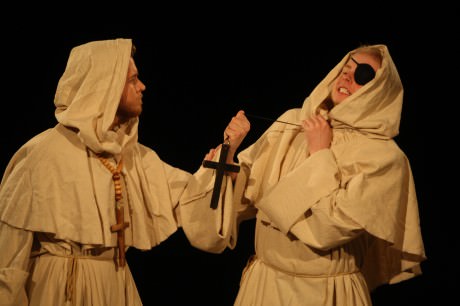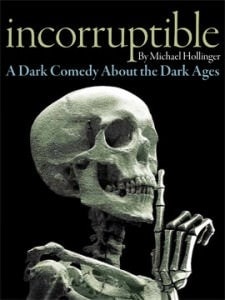The Dark Ages bring about a plethora of negative connotations: plague, pestilence, death, etc. But if I told you there was comedy to be found amid this dreary bleak time perhaps you might be the one laughing at me. But you will find that dark humor at the University of Maryland Baltimore County Theatre Department’s production of Michael Hollinger’s Incorruptible.
Directed by Assistant Professor Colette Searls, this show delves into the darkness of a struggling monastery in France 1250 A.D. Their miracle relic, the bones of Saint Foy, have failed to produce a miracle in nearly 13 years and the monks are facing financial and spiritual peril. What do you do when your miracle saint runs dry? Dig up a new one of course. Come along and watch this cataclysmic event unfold as Hollinger (whose note says “…this sort of thing really happened…”) uses Catholic Church as a vessel for corruption.

The most striking thing about this production comes from the ridiculous costume that is showcased at the end of Act II. Costume Designer Elena Zlotescu lets her creativity flourish in Sister Agatha’s ensemble. Her dress is reminiscent of a quilted white wedding gown with a giant glitter gold cross that streaks down the front. And her habit looks like an enormous Faberge Egg that has been spun out of pink candy floss and cracked open to reveal a golden interior. This ensemble makes her character all the more comical as she storms onto the stage with accusations shooting from her mouth like gunfire at high noon. Zlotescu also extends her creative imagery to the set with crumbling brick walls that are literally leaning in toward the audience to create the illusion that the monastery is collapsing and in disrepair.
And a nod is well-deserved to Sound Designer Adam Mendelson who creates a great montage of humorous songs loosely based on the Christian faith to play both before the show starts and after the show dismisses. Songs like “Vatican Rag” by Tom Lehrer and “If Jesus Were A Pirate.” Mendelson gets the audience prepared for the dark humor of the show with his song choices and helps enhance the comical nature of the production.
The main problem with this production comes from the director and actors’ execution of their comedy. Searls allows the actors to develop strong characters with their own distinctive quirks and personalities, but their comic timing is virtually non-existent. Hollinger has written hysterical jokes into the show but many of them are missed or fall flat due to the delivery of the lines, particularly with Brother Martin (Brad Widener) – an over-the-top dramatic character with a flippant tongue and sarcastic biting wit. It felt as if Martin and his fellow actors knew a line was funny and tried to make it funnier by really hamming it up or playing it up. Unfortunately, this just killed the joke for the audience, making it feel forced and unnatural.
The person who executed perfect comic styling on stage, however, was Sister Agatha (Jessica Ruth Baker). Exploding onto the stage in a furious rage Baker’s character brings it all together at the end of the show. She is talked about throughout the production, her reputation proceeding her arrival so that when she finally bursts through the monastery’s door it is every bit as hilarious as you would expect it to be. Baker commands her presence on stage by playing her role with serious anger and stoic frustration. The more serious she becomes – the funnier her character gets.
The physicality of the actors is rather impressive. We see a fantastic series of pantomime gestures coming from Marie (Sydney Kleinberg) throughout the show. She first appears as a mime dancer and then later as the “incorruptible” on the alter wherein many of her emotions are expressed silently through gesture.
Character development is key in this show and is well executed despite the faults of the ill-timed comic delivery. Each of the four brothers and the traveling minstrel develop an individual personality that distinguishes them from one another. Brother Charles (Anderson Wells) presents a humbled man with unending blind faith. Wells carries a heavy energy in his character, moving slowly and purposefully about the space as he tries to run the monastery, doing what he believes is best to keep their order from perishing. He uses a centrally focused anger when expressing his resentment and rivalry with his sister, deep enough to let the audience feel his pain. We find the opposite in Brother Martin. His character is tightly wound with a shaky energy that gets released through his biting wit. Widener has very expressive eyes and uses his whole body to express his frustration and anxiety over the troubles of the order, especially when the churchyard runs out of bodies.

And then we have Brother Olf (Daniel Friedman) the stereotypical ‘stupid man.’ Friedman does not fall victim to the physical attributes of being the dumb muck at the bottom of the pecking order, but rather exudes his ignorance through cleverly crafted facial expressions and the way in which he asks his questions.
When the four brothers encounter the minstrel Jack (David Brasington) their interactions are wildly entertaining. Watching a mass of monks crowd around a man they are about to impart nefarious deeds upon is a rather amusing sight. Brasington has perfect chemistry with Friedman, the pair acting out the roles of master and stooge with an exceptional balance every time they are on stage together. Brasington carries a large portion of the show, being a sounding board and then a catalyst for the action.
So bring a shovel, and get ready for the darkness of UMBC’s Incorruptible.
Running Time: Two hours with one intermission.
Incorruptible plays through April 28, 2012 at the UMBC Theatre Building – 1000 Hilltop Circle, in Baltimore, MD. To make a reservation, call the box office at (410) 455-2476. To purchase tickets, order by phone with a credit card by calling (410) 752-8950, or by purchasing them online.




